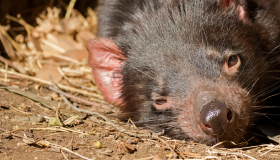June 8, 2017 – Viruses are everywhere, and infect nearly every living species, from animal to plants to bacteria; there are even viruses that infect other viruses!
Although we tend to think of viruses causing diseases like the flu or common cold, it’s becoming increasingly clear that viruses have strong links to certain cancers, both in people and animals. Nowhere is this more obvious than in cats, where cancer-causing viruses have been recognized for decades. Morris Animal Foundation and others are working to find ways to prevent, diagnose, and treat these dangerous viruses and give cats a better chance at a long, healthy life.
How do viruses cause cancer?
Viruses usually cause cancer by one of three mechanisms:
- Through disruption of a cell’s genetic machinery resulting in uncontrolled growth in a host’s cells
- By compromising an individual’s immune system, making them more vulnerable to cancer development
- By causing chronic inflammation, which in turn is linked to cancer.
Which viruses can cause cat cancers?
Feline leukemia (FeLV) virus is one of the best known and well-studied cancer-causing viruses in cats. FeLV can cause cancer by directly promoting transformation of normal cells into cancerous cells, and by causing significant immunosuppression, which makes a cat more vulnerable to both infections and cancer.
Feline immunodeficiency virus (FIV) also causes a variety of cancers in cats. Like its human counterpart, FIV is thought to predispose cats to cancer by causing profound immunosuppression.
Feline papilloma virus is another virus recently implicated in cancer development, although there remains a lot to learn about this virus. Papillomaviruses are found worldwide but are species specific. In people, these viruses have been implicated in the development of many cancers. This is an active area of research, and more work is being done to try to understand the role these viruses play (if any) in cat cancer.
Gammaherpesviruses are known to cause cancer in other species, and have recently been found in cats worldwide. Several research teams are examining whether this virus could be a cause of cancer in cats.
Why the interest in cancer causing viruses?
Looking for viral causes of cancer gives us another potential treatment target. Dr. Julia Beatty, Professor of Feline Medicine at the University of Sydney and a Foundation-funded researcher, is an expert in feline infectious disease, and much of her research is focused on looking for evidence of virus in cat cancer tissues.
“If there are cancer-causing viruses to be found in these cats, we are going to find them,” said Dr. Beatty. “A lot of the genetic material in the tumor is going to be the cat’s own DNA. So we end up with a huge amount of data- the haystack. We then sift through the haystack to look for genetic sequences that look like viruses - the needles. If we find new viruses in these cancers, the next steps are to work out if and how these viruses cause cancer so we can design ways to stop them. Our long term goal is to develop improved treatments and, potentially, anti-cancer vaccines for cats.”
What can I do to prevent my cat from getting infected with a cancer-causing virus?
The good news is you can take steps to protect your cat. Since the development of the first FeLV vaccine, coupled with better management measures (and an increased understanding of virus transmission), global rates of FeLV-related lymphoma have decreased from 70 percent to 15 percent. Although we don’t have a vaccine against FIV, we know a lot more about how the virus behaves, resulting in better control strategies.
Test any new additions to the household for FeLV and FIV is another way to decrease the possibility of introducing these viruses to your other cats. Finally, see your family veterinarian for routine check-ups, as well as any time your kitty is feeling under the weather, to help detect cancers early, a key factor in successful treatment.
What is Morris Animal Foundation doing to stop cancer-causing viruses?
Morris Animal Foundation has a long history of funding innovative research in feline virology, including studies that led to the development of the first feline leukemia virus vaccine. The Foundation has several ongoing studies specifically aimed at determining the role of viruses in cat cancers.




